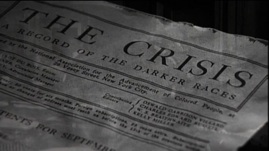Teachers' Domain - Digital Media for the Classroom and Professional Development
User: Preview

Source: The Rise and Fall of Jim Crow:"Fighting Back"
This video describes W.E.B. Du Bois' role as editor of the NAACP journal The Crisis. Under Du Bois' leadership The Crisis began a crusade against atrocities perpetrated upon African Americans. With impassioned articles, readership grew to over 100,000 subscribers. After securing President Wilson’s support for desegregation in federal hiring, Du Bois was disappointed when Wilson instead gave his consent to Southern cabinet members to segregate their departments.
W.E.B. Du Bois was born during the term of President Andrew Johnson and died the year that Lyndon Johnson became president. Du Bois was born and raised in Massachusetts, and graduated in 1888 from Fisk University, a black liberal arts college in Nashville, Tennessee. During the summer, he taught in a rural school and later wrote about his experiences in his book The Souls of Black Folk.
In 1895, Du Bois became the first African American to receive a Ph.D. in the subject of history from Harvard University. With the publication of The Philadelphia Negro: A Social Study in 1899, the first case study of a black community in the United States, as well as papers on black farmers, businessmen, and black life in Southern communities, Du Bois established himself as the first great scholar of black life in America.
He taught sociology at Atlanta University between 1898 and 1910. Du Bois had hoped that social science could help eliminate segregation, but he eventually came to the conclusion that the only effective strategy against racism was agitation. He challenged the dominant ideology of black accommodation as preached and practiced by Booker T. Washington, then the most influential black man in America. Washington urged blacks to accept discrimination for the time being and elevate themselves through hard work and economic gain to win the respect of whites.
In 1903, in his famous book The Souls of Black Folk, Du Bois charged that Washington's strategy kept the black man down rather than freed him. This attack crystallized the opposition to Booker T. Washington among many black intellectuals, polarizing the leaders of the black community into two wings -- the "conservative" supporters of Washington and his "radical" critics. In 1905, Du Bois took the lead in founding the short-lived Niagara Movement, intended to be an organization advocating civil rights for blacks. Although the Niagara Movement faltered, it was the forerunner of the National Association for the Advancement of Colored People (NAACP), which was founded in 1909. Du Bois played a prominent role in the organization's creation and became its director of research and the editor of its magazine, The Crisis.
In 1951, when he was 83 years old, the federal government prosecuted Du Bois for his affiliation with the Communist Party. A judge eventually threw out the case. Disillusioned with the United States, he officially joined the Communist Party in 1961 and moved to Ghana; he renounced his American citizenship more than a year later.
--adapted from the website The Rise and Fall of Jim Crow
NARRATOR: If the South would not change, Du Bois would. He moved to New York in 1910 to join forces with the National Association of the Advancement of Colored People – the NAACP- a newly formed interracial organization that would become the driving force in the civil rights movement.
Appointed editor of the NAACP’s journal the Crisis, Du Bois was determined to forge the magazine into a weapon against Jim Crow. The Crisis battled racial discrimination, exposed atrocities and outrages against blacks, supported women’s rights and promoted race pride in the arts and literature.
Within four months, the number of subscribers jumped from 1000 to 6000 and eventually soared to over 100,000. Du Bois startled his readers in 1912 when he supported Woodrow Wilson for President even though Wilson was a Democrat and a Southerner. Wilson, he said, had promised fairness and justice for blacks and he seemed a man of his word. But Dubois warned Wilson what blacks expected from him.
DU BOIS (ACTOR): We want to be treated as men. We want to vote. We want our children to be educated. We want lynching stopped. We want no longer to be herded as cattle on street cars and railroads. We want the right to earn a living and own property. Be not untrue, President Wilson, to the highest ideals of American Democracy.
NARRATOR: Immediately after his election, Wilson gave the green light to three Southern cabinet members to segregate their departments. One white supervisor boasted. "There are no Government positions for Negroes in the South. A Negro’s place is in the cornfield." Du Bois attacked Wilson.
DU BOIS (ACTOR): The federal government has set the colored apart as if mere contact with them were contamination. Behind screens and closed doors they now sit as though leprous. How long will it be before the hateful epithets of "Nigger" and "Jim Crow" are openly applied?
 Loading Standards
Loading Standards